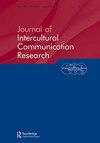泰国独立西方移民的语言有限的跨文化适应:“泰式出租车”交际策略
Q1 Social Sciences
Journal of Intercultural Communication Research
Pub Date : 2021-06-30
DOI:10.1080/17475759.2021.1946840
引用次数: 1
摘要
本文研究了泰国曼谷独立长期居住的西方移民(IWMs)的文化语言适应,重点关注他们学习和使用泰语与适应泰国文化规范之间的动态关系。通过对24名外籍员工的深入访谈,我们了解到参与者的复杂经历,在这些经历中,文化知识的获取往往会阻碍他们的语言学习和使用,而不是这两种机制相互作用,增强东道主的沟通能力。结果是语言有限的跨文化适应,“出租车泰语”作为一种沟通策略,允许IWMs与泰国人和心理健康建立有效的功能关系。本文章由计算机程序翻译,如有差异,请以英文原文为准。
Linguistically-Limited Intercultural Adaptations of Independent Western Migrants in Thailand: “Taxi Thai” Communication Strategy
ABSTRACT This article examines the cultural-linguistic adaptations of independent long-staying Western migrants (IWMs) in Bangkok, Thailand, focusing on the dynamic relationship between their learning and use of Thai language and adaptations to Thai cultural norms. Through intensive interviews with 24 IWMs, we gained insights into complex experiences of the participants in which gaining cultural knowledge often forestalled their language learning and use instead of these two mechanisms acting to mutually reinforce host communication competence. The result was linguistically-limited intercultural adaptations with “Taxi-Thai” serving as a communication strategy that allowed the IWMs to accomplish effective functional relationships with Thais and psychological wellbeing.
求助全文
通过发布文献求助,成功后即可免费获取论文全文。
去求助
来源期刊

Journal of Intercultural Communication Research
Social Sciences-Cultural Studies
CiteScore
2.00
自引率
0.00%
发文量
20
 求助内容:
求助内容: 应助结果提醒方式:
应助结果提醒方式:


